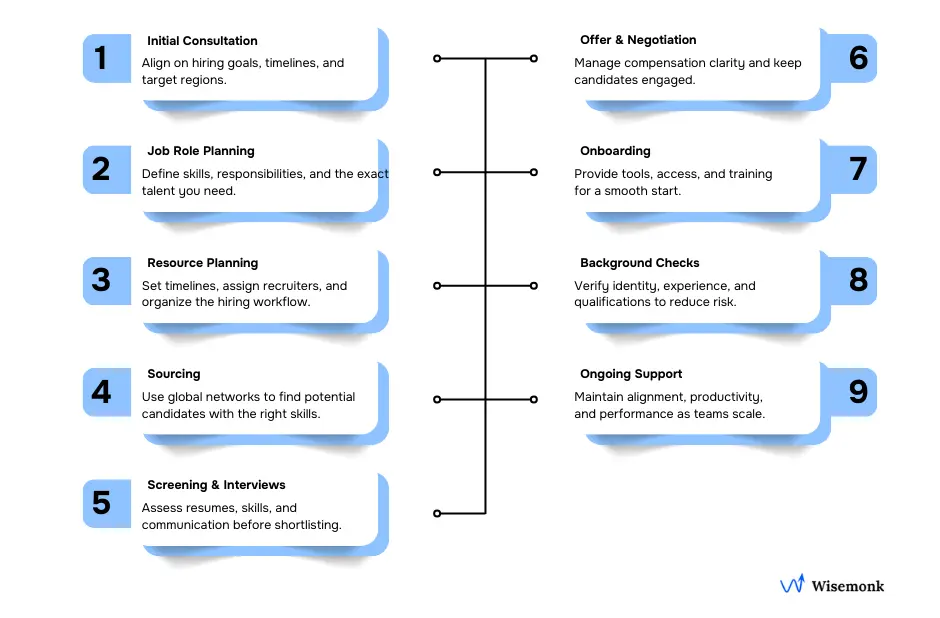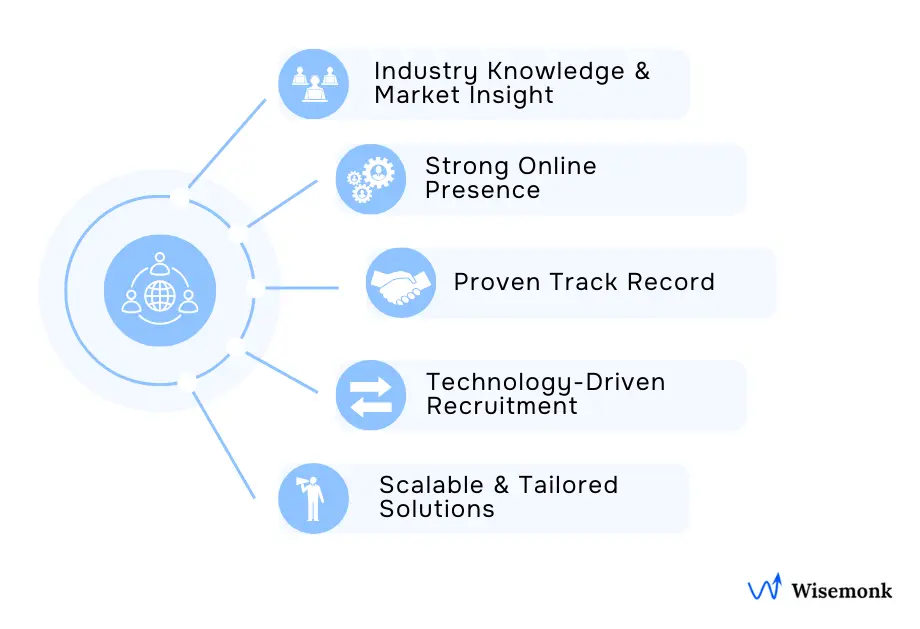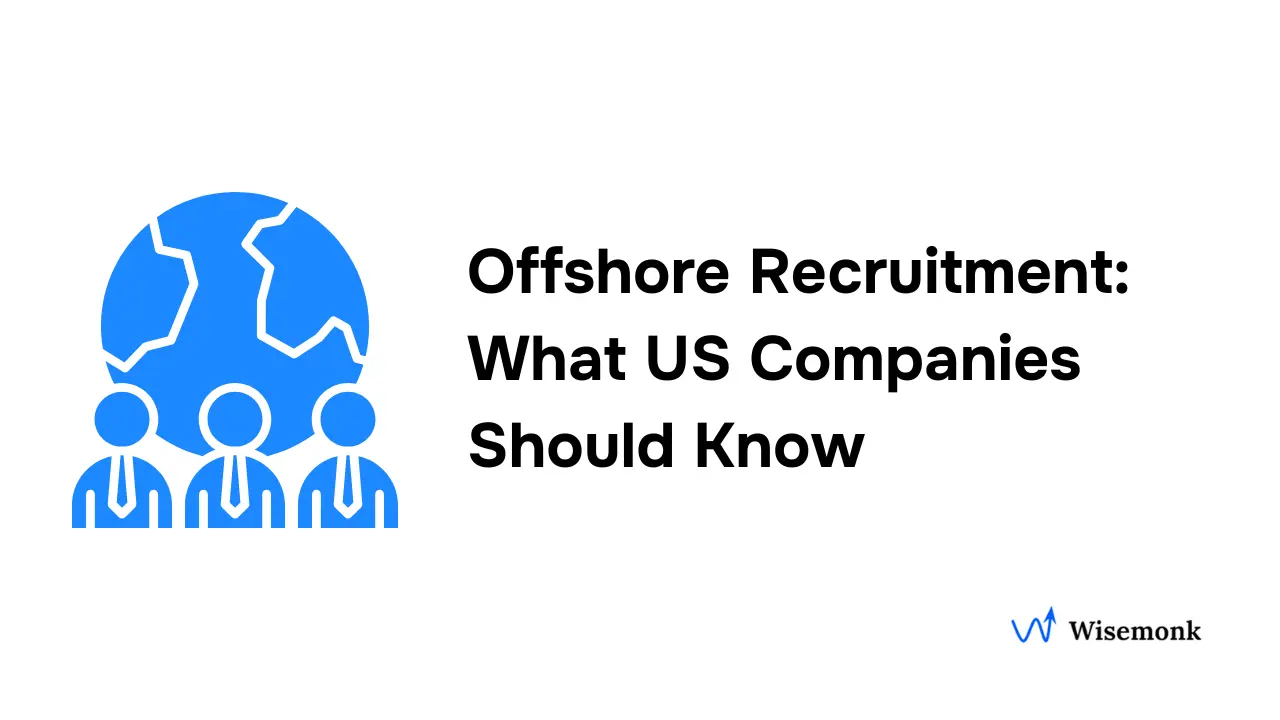- Offshore recruitment is a process of sourcing and hiring talent from global markets, giving organisations access to specialised expertise, lower recruitment costs, and the ability to scale teams more efficiently.
- The main process of offshore recruitment involves a structured workflow that includes defining hiring needs, planning roles, sourcing offshore talent, conducting thorough screening, offer management, onboarding, background checks, and ongoing support.
- Key factors in choosing the right offshore recruitment partner include industry expertise, a strong online presence, a proven track record, modern recruitment technology, and scalable solutions that support long-term growth.
- The key legal aspects of hiring offshore employees include navigating labor laws, tax obligations, compliant contracts, and data protection rules across different countries and also ensuring proper worker classification to avoid penalties.
Looking for offshore recruitment help? Speak with our experts now!
Discover how Wisemonk creates impactful and reliable content.
Looking to expand your team without the headaches of traditional hiring? You’re not alone; many U.S. businesses, founders, and global teams struggle to find offshore recruitment strategies that actually work. The hurdle isn’t simply finding talent, it’s about getting the right talent, managing a dispersed workforce across time zones, and keeping costs under control while maintaining high standards.
According to Genius, the global offshoring market is worth US $235 billion in 2025 and is projected to reach nearly US $360 billion by 2033, showing just how quickly companies are turning to offshore hiring to solve these exact challenges.
As the demand for offshore talent rises, the need for a clear strategy becomes even more important. In this article, we’ll break down what offshore recruitment is, why it matters, and how you can execute a hiring strategy that delivers real results, so you can scale smarter, faster, and with confidence. Let’s dive in.
What is offshore recruitment?[toc=Offshore Recruitment]
Offshore recruitment refers to the process of hiring employees or contractors located in another country to support your company’s operations, projects, or long-term workforce strategy.
Instead of relying only on local applicants, businesses tap into a global talent pool and recruit skilled professionals who work remotely, often across different time zones, using digital tools, online platforms, and structured communication systems to collaborate with onshore teams.
Curious how outsourcing and offshoring compare for your specific operations? Check out our article “Outsourcing vs Offshoring: Key Differences & Best Model”
How does offshore recruitment work? A step-by-step guide[toc=How it Works]
Offshore recruitment is a structured process, but with the right strategy, you can build a high-performing global team smoothly and without unnecessary complications.
Based on our experience helping companies with full-scale offshore hiring operations, here’s exactly how the offshore recruitment process works, step by step.

Step 1: Initial Consultation
This stage starts with a simple conversation about your hiring goals, timelines, and the kind of offshore talent you're trying to bring in. Your recruitment partner uses this to understand your challenges, budget, and preferred regions. This alignment makes the entire offshore recruitment process smoother and easier to execute.
Step 2: Job Role Planning
Here, you work together to define the exact role, skills, responsibilities, and expectations so everyone knows what “right talent” actually looks like. This clarity helps reduce mismatches and keeps candidates aligned from the start. It sets the tone for a more efficient offshore hiring process.
Step 3: Resource Planning
The recruitment agency maps out timelines, assigns recruiters, selects sourcing tools, and builds a workflow based on your hiring goals. Proper planning ensures the team has the bandwidth and structure to support your offshore operations. This step keeps everything organized and moving at the right pace.
Step 4: Sourcing
Recruiters tap into global talent pools, offshore job boards, and networks across India, LATAM, and Eastern Europe to find potential candidates. They focus on matching both technical skills and cultural fit. Strong sourcing sets the foundation for high-quality offshore candidates. Strong offshore recruiting strategies rely on global networks, niche platforms, and region-specific sourcing expertise.
Step 5: Screening and Interviewing
Candidates go through resume checks, skills assessments, and communication tests before reaching your team. Only those who truly match your requirements make it to the interview stage. This saves time and ensures each conversation counts.
Step 6: Offer Extension and Discussion
Once you select a candidate, the agency handles the offer, negotiation, and clarity around compensation and role expectations. They ensure nothing gets lost across time zones or cultural differences. A smooth offer process keeps top talent engaged until they sign.
Step 7: Onboarding
Your new offshore employee receives the tools, documentation, access, and training needed to start strong. The agency supports setup and ensures the hire integrates smoothly into your workflows. Great onboarding boosts early productivity and retention.
Step 8: Background Checks
Recruiters verify identity, work history, education, and conduct additional checks depending on the role. This protects your business from compliance risks and ensures trustworthy offshore hires. It’s a simple step that makes a big difference in quality.
Step 9: Ongoing Support
Even after onboarding, the agency stays involved to support communication, performance alignment, and issue resolution. This ensures offshore employees stay productive and connected to your team’s goals. Ongoing support keeps your offshore operations stable as you scale.
This offshore recruiting framework ensures you hire efficiently and stay compliant across borders.
What are the key benefits of offshore recruitment?[toc=Key Benefits]
Offshore recruitment offers numerous benefits, from accessing a broader talent pool to reducing operational costs. With our experience in helping companies with offshore recruitment, talent acquisition, and project management,
Here are the key benefits offshore recruitment brings to your business, from cost savings to improved productivity:
- Access to a global talent pool: Offshore recruitment opens the door to best talent from top offshore markets like India, LATAM, and Eastern Europe, helping companies find qualified candidates for specialized roles in tech, engineering, offshore wind, renewable energy, and complex offshore projects.
- Cost savings and reduced recruitment costs: With offshore hiring, businesses benefit from cost-effective salaries, lower operational expenses, and reduced recruitment costs. Offshore recruitment services also help companies hire talent with the right skills from day one, lowering training and onboarding overhead.
- Faster and more efficient hiring process: Offshore recruitment agencies streamline sourcing, screening, and interviewing through deep industry expertise and proven recruitment solutions. This speeds up your hiring process, ensures access to top talent, and keeps project timelines on track.
- Scalability for offshore operations and global projects: Offshore recruiting makes it easy for US companies to scale their workforce quickly, whether you're ramping up for new offshore projects, expanding your remote teams, or building long-term global operations. It gives you far more flexibility and speed than traditional local hiring can provide.
- Round-the-clock productivity across time zones: By leveraging offshore talent in different time zones, companies get near 24/7 progress on tasks and offshore operations. This continuous workflow improves project delivery, enhances client satisfaction, and keeps critical business functions moving even when onshore teams are offline.
Effective offshore recruiting opens access to exceptional talent while keeping hiring costs manageable.
Now that we’ve covered the key benefits of offshore recruiting, it’s equally important to understand the challenges that come with it. In the next section, we’ll break down the most common challenges companies face when hiring offshore talent.
What are the challenges in offshore recruitment?[toc=Challenges]
From navigating cultural barriers to ensuring clear communication, it’s essential to have strategies in place to overcome common obstacles in offshore hiring.
In this section, we’ll explore the key challenges and provide solutions based on our experience helping businesses manage offshore recruitment processes.
- Overcoming Cultural Barriers: Cultural differences can impact communication and work expectations. It’s essential to understand these differences and create a collaborative environment.
- Miscommunication and Lack of Communication: Time zone differences and language barriers can lead to misunderstandings. Using clear communication tools and setting expectations helps avoid delays.
- Scheduling Interviews Effectively: Coordinating interviews across time zones can slow down the process. Proper planning and scheduling tools streamline interview coordination.
- Managing Lack of Interest and Cooperation: Candidates may be less engaged when working remotely. Building rapport early and maintaining clear communication keeps candidates interested.
- Addressing Poor Quality of Work: Inconsistent quality may arise without clear expectations. Setting clear standards, providing training, and offering regular feedback ensures high-quality output.
- Legal and Regulatory Risks: Offshore recruitment involves different labor laws and compliance regulations. Partnering with an EOR or recruitment agency ensures legal compliance and reduces risks.
Pro Tip: To effectively navigate the challenges of offshore recruitment, consider partnering with an Employer of Record (EOR). An EOR can handle compliance, payroll, and legal requirements across different regions, allowing you to focus on finding the right talent.
How do you choose the right offshore recruitment partner?[toc=Find Right Partner]
Choosing the right offshore recruitment partner is crucial for ensuring you find qualified candidates quickly and efficiently while minimizing risks.
Through our work assisting companies in offshore recruitment and talent acquisition, here are the top factors to look for in a recruitment partner.

- Industry Knowledge and Market Insight: Choose a partner with strong expertise in your field, especially in sectors like offshore energy or renewable energy. Their market insight helps them source skilled professionals who fit your unique needs.
- Strong Online Presence: A credible online presence shows professionalism and strong communication skills. It also reflects their ability to engage and attract talent from a global talent pool.
- Proven Track Record: Look for client reviews and testimonials that highlight successful placements and long-term partnerships. A partner with a solid track record consistently delivers top talent and reliable recruitment support.
- Technology-Driven Recruitment: The right partner uses modern tools for sourcing, screening, and communication. This leads to a faster, more transparent offshore recruitment process and better hiring outcomes.
- Scalable Solutions: Select a partner offering flexible, scalable recruitment solutions that grow with your business. This ensures you can expand your offshore workforce smoothly as needs evolve and and the ability to create tailored solutions for specific roles, markets, or offshore operations.
By keeping these factors in mind, you can confidently choose an offshore recruitment partner who will help you find the right candidates while supporting your business’s growth and operations around the world.
How can you manage offshore employees effectively?[toc=How to Manage]
From ensuring effective communication to overcoming cultural differences, it’s essential to put processes in place to align offshore teams with your business goals.
In this section, we’ll explore the best practices to manage your offshore workforce, helping you scale operations efficiently across time zones and borders.
Ensuring Effective Communication with Offshore Teams
Strong communication keeps your offshore talent aligned with onshore goals. Use structured communication channels, clear response-time expectations, and collaboration tools that support both real-time and async work. Offshore agencies and offshore partners often recommend weekly video check-ins and shared dashboards to maintain clarity.
Managing Time Zone Differences
Time zones can be a challenge, but they can also boost productivity when managed well. Create overlapping hours for essential meetings, build predictable routines, and use project management tools that help teams hand off tasks smoothly. This approach keeps offshore operations moving even when your local team signs off.
Addressing Cultural Differences
Cultural differences are common when working in the offshore industry, and addressing them early helps prevent misunderstandings. Promote an open, inclusive environment where offshore employees feel comfortable asking questions and sharing feedback. Simple cultural awareness training can go a long way toward strengthening collaboration.
Maintaining Company Culture with Offshore Teams
Your offshore talent should feel like part of your core team, not a separate extension. Celebrate wins together, share company updates openly, and involve offshore partners in milestone meetings. This keeps morale high and ensures your offshore operations stay connected to your broader mission.
Best Practices for Managing Offshore Teams
Effective offshore management relies on clear expectations, structured project management, and regular performance feedback. Use shared workspaces, documented processes, and recurring check-ins to keep everyone aligned. When offshore agencies or offshore partners support your workflow, consistency and quality improve significantly.
You might also be interested in learning how to manage remote teams effectively. Check out our article “Remote Team Management: Tips, Tools & Best Practices"
What are the legal aspects of hiring offshore employees?[toc=Legal Considerations]
With our experience supporting companies through offshore recruitment and global workforce management, we understand the importance of navigating legal complexities.
Here’s a breakdown of the key legal aspects you need to consider when hiring offshore employees to ensure compliance and protect your business:
- Labor and Employment Laws: Each country has its own set of rules for working hours, paid time off, benefits, and termination procedures. Understanding local labor laws ensures your offshore operations comply with regional standards and avoid legal complications.
- Tax Compliance and Withholding: Offshore recruitment often requires navigating complex tax laws in both the employee’s home country and your home country. This includes withholding taxes, social security contributions, and reporting requirements for offshore workers.
- Contract Terms: Offshore employees or contractors must have clear contracts that outline the terms of employment, roles, responsibilities, compensation, and benefits. These contracts should also address any local regulations that apply to the employment relationship.
- Intellectual Property (IP) Protection: Protecting your IP when working with offshore talent is critical. Offshore recruitment agreements should include clauses regarding ownership of intellectual property, non-disclosure agreements (NDAs), and confidentiality to prevent theft or misuse.
- Data Protection and Privacy Laws: Different countries have varying laws around data protection and privacy (e.g., GDPR in Europe). When working with offshore talent, make sure to comply with the relevant data protection laws to safeguard your company’s sensitive information.
- Worker Classification: It’s essential to correctly classify offshore workers as employees or independent contractors based on their job role and the laws of their home country. Misclassification can lead to penalties and legal challenges regarding tax and benefits obligations.
Now that we’ve covered the legal and compliance essentials, let’s look at how you can manage offshore recruitment end-to-end, from hiring and onboarding to payroll, compliance, and ongoing team support.
How Wisemonk simplifies offshore recruitment for your business?[toc=Why Choose Wisemonk]
Wisemonk is a trusted Employer of Record (EOR) in India that simplifies the process of hiring, paying, and managing employees for global companies, all without the need to set up a local entity. Our extensive knowledge of local labor laws, tax compliance, and international workforce management enables businesses to expand swiftly while ensuring full compliance and operational efficiency.
Here’s what you can expect from Wisemonk as your offshore recruitment partner:
- Quick onboarding: Bring on top talent within days, not months, with fully compliant contracts and a smooth setup process.
- Effortless payroll management: We manage salaries, taxes, and statutory filings across regions, ensuring accuracy and timely processing.
- Complete employee benefits: From health coverage to paid time off, we provide competitive, locally compliant packages that help attract the best talent.
- Dedicated HR support: Our HR team oversees daily operations, employee engagement, and issue resolution, keeping your team motivated and efficient.
- Comprehensive compliance: With our up-to-date local expertise, we safeguard you from legal and regulatory risks, ensuring continuous compliance.
India remains our core strength, but we’re rapidly growing in key global markets like the United States, the United Kingdom, and beyond. With Wisemonk, you gain a trusted partner for both your India operations and your wider global recruitment needs.
Want to find candidates faster through offshore recruitment? Book a free consultation today. One partner for recruiting and EOR. Faster hires, zero risk, happier teams.
Our client's words:
"Wisemonk is easy to implement and use. We have been able to hire and manage overseas resources without any hassle. The support by the Wisemonk team is top class, We have a dedicated account manager who ensures that all our queries are answered and resolved immediately." — Manasij G., Co-founder and CEO at ZapScale Read the full review on G2 →
Frequently asked questions
What is the meaning of offshore employment?
Offshore employment refers to hiring employees in countries outside your company’s home base to access specialized talent, reduce costs, reduce labor expenses, and scale more efficiently. It enables businesses to build distributed teams across borders while meeting local compliance and operational requirements.
What does offshore staffing mean?
Offshore staffing is the practice of hiring remote workers or dedicated teams from foreign countries, usually in cost-effective regions, to expand capabilities and fill talent gaps. It allows companies to grow quickly, maintain flexibility, and reduce overhead while accessing skilled professionals worldwide.
Can offshore recruitment be a long-term solution for US companies?
Offshore recruitment can absolutely serve as a long-term solution because it provides consistent access to global talent, supports cost-effective scaling, and helps businesses reduce costs while integrating smoothly into modern workforce models. With strong processes and communication, offshore teams can drive sustained growth and operational efficiency.
How does offshore recruitment help companies scale faster?
Offshore recruitment speeds up scaling by enabling companies to quickly fill roles, expand team capacity, and reduce hiring bottlenecks without the cost or delays of local recruiting. It provides access to skilled global talent, increases productivity, and supports flexible team growth aligned with business needs.
What are the benefits of offshore recruitment for businesses?
Offshore recruitment offers cost savings, a larger talent pool, and agile team expansion that helps companies stay competitive. It reduces operational overhead, addresses skill shortages, and provides access to specialized expertise across global markets.
How do you manage communication across different time zones in offshore recruitment?
Managing communication across time zones requires using asynchronous tools, creating overlapping work windows, and setting clear response-time expectations to keep collaboration smooth. This ensures teams stay aligned and productive despite geographical differences.
What are the legal challenges of offshore recruitment?
Legal challenges in offshore recruitment include navigating foreign labor laws, tax obligations, and data-protection requirements across multiple jurisdictions. Companies must ensure full compliance to avoid legal issues and maintain seamless global operations.

%20(1).webp)
%20(1).webp)
%20(1).webp)